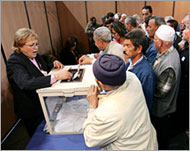Violence hits Algeria ahead of vote
Seven Algerian soldiers and four civilians have been killed in attacks in eastern Algeria as voters prepare for a referendum.

The latest outbreak of violence is part of a 13-year-long battle in this North African country, where voters are to take part in a referendum on Thursday on a presidential peace plan that would wipe the legal slate clean for many groups.
The Algerian daily Liberte reported that suspected members of the Salafist group, in the town of Selma about 250km east of Algiers, had attacked a military patrol charged with protecting electricity workers who were putting up a power line on Thursday.
A homemade roadside bomb was detonated, immobilising a military vehicle. The attackers then opened fire, killing seven soldiers and two workers, the report said. Four other soldiers were injured.
The same day, two people were killed near the town of Tamalous, about 450km east of the capital, at a roadblock set up by an armed group of about 30 people, Liberte said.
|
“It is very important for us, for our children to be able to go home in tranquillity” |
About 150,000 people have died in fighting in Algeria since 1992, after the military cancelled the country’s first multiparty legislative elections when it became evident that the now-banned Islamic Salvation Front party – known by its French acronym, FIS – would win.
The army installed President Abdelaziz Bouteflika in 1999 in what was widely declared a fraudulent election but claimed neutrality in his 2004 landslide re-election victory, according to the US government’s CIA website.
Bouteflika has reiterated that leaders of the FIS are barred from exercising any political activities, Aljazeera reported.
Addressing a campaign rally to win support for the referendum to bring reconciliation after the civil strife, Bouteflika said, “Those who ignited the crisis in Algeria could not be allowed to exercise any political activities in the country.”
The leader of an Algerian Islamist party on Saturday gave Bouteflika’s reconciliation proposal cautious support.
In an interview with Aljazeera, Abdullah Jab Allah, the leader of the National Reform Movement in Algeria, said the proposal was “the most that could be attained amid the current circumstances in the country”.
Jab Allah called on Algerians to support Bouteflika’s proposal, although he said it was more of an amnesty than a reconciliation.
Voters abroad
Meanwhile, almost one million Algerians living abroad got the chance to vote from Saturday on a referendum.
Voting by the 903,727 Algerian voters registered abroad, including 761,753 in France, takes place from Saturday to Thursday.
 |
|
Algerians living in France started |
The charter would end legal proceedings against groups “who have already halted their armed activity and surrendered to the authorities” but exclude “those involved in mass massacres, rapes and bomb attacks in public places”.
There was a festive atmosphere as hundreds of Algerians converged on a sports centre in France‘s southern city of Marseille to vote.
“It is very important for us, for our children to be able to go home in tranquillity,” said Lalia Benabdelkader, one of the voters.
Boycott urged
On Monday, Bouteflika told a rally in the northeastern region of Kabylie: “There is no other alternative solution” than the proposed charter.
Algeria‘s opposition Socialist Forces Front has called for a boycott of the charter, arguing that it “cannot endorse a text that glorifies force and deprecates political mediation, consecrates impunity and amnesty, and in the end negotiates away pain and suffering”.
Algeria’s overseas voters, who can vote in about 300 voting stations in 113 centres, are spread across North Africa, central and southern Africa and Asia, Britain, Belgium and beyond.